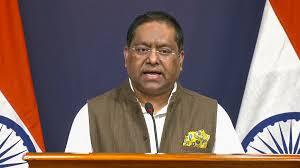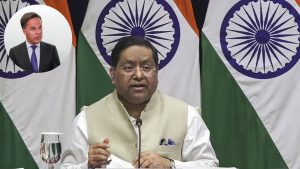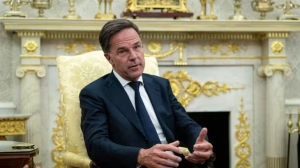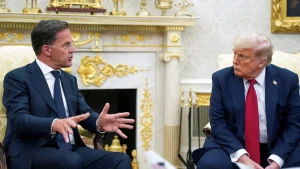New Delhi – India Slams NATO Chief Mark Rutte following his warning about potential “100% secondary sanctions” against countries maintaining trade relations with Russia. The Ministry of External Affairs delivered a firm response, emphasizing that securing energy needs remains an overriding priority for New Delhi while cautioning against double standards in international trade policies.
The diplomatic confrontation emerged after NATO Secretary General Mark Rutte threatened severe economic consequences for nations continuing business relationships with Russia, specifically targeting Brazil, China, and India. This development has prompted India Slams NATO Chief rhetoric from official channels, highlighting the complex geopolitical tensions surrounding energy security and international sanctions regimes.
MEA’s Firm Stance on Energy Security

Ministry of External Affairs spokesperson Randhir Jaiswal addressed the controversy during the weekly media briefing in Delhi, delivering a measured but firm response that demonstrated how India Slams NATO Chief warnings while maintaining diplomatic decorum. Jaiswal emphasized that securing energy needs represents an “overriding priority” for the Indian government and its people.
The official statement underscored India’s commitment to energy security, with Jaiswal noting that the country’s energy policies are “guided by what is on offer in the markets and by prevailing global circumstances.” This response effectively illustrates how India Slams NATO Chief pressure tactics while asserting sovereign decision-making authority over energy procurement strategies.
Also Read: Anti Terror Mock Drills In Delhi: Major 2-Day Security Exercise Begins Today
Warning Against Double Standards


The most significant aspect of how India Slams NATO Chief statements came through Jaiswal’s explicit warning against double standards in international trade policies. The MEA spokesperson specifically cautioned against applying selective criteria to different nations’ trade relationships, suggesting that such approaches undermine the credibility of international sanctions frameworks.
This warning reflects broader concerns about how India Slams NATO Chief positions that appear to ignore the complex realities of global energy markets. Indian officials have consistently argued that energy security cannot be compromised based on political considerations, particularly when alternative suppliers cannot meet the country’s massive energy requirements.
Rutte’s Congressional Warning

NATO Secretary General Mark Rutte’s warning that prompted India Slams NATO Chief responses came during his meeting with US Senators in Congress. Rutte explicitly stated that countries such as Brazil, China, and India could face “100% secondary sanctions” if they continued conducting business with Russia, representing a significant escalation in Western pressure tactics.
The NATO chief’s comments, which led to India Slams NATO Chief diplomatic responses, included suggestions that these countries should directly contact President Vladimir Putin to pressure him into serious peace negotiations regarding the Ukraine conflict. Rutte warned that continued Russian trade relationships would “slam back on Brazil, on India and on China in a massive way.”
Alignment with US Position


Rutte’s stance, which triggered India Slams NATO Chief reactions, echoed positions taken by US President Donald Trump, who recently threatened severe tariffs on countries maintaining trade relationships with Russia. This coordinated Western approach has intensified pressure on major developing economies to align with NATO’s strategic objectives regarding Russia.
The synchronized messaging that prompted India Slams NATO Chief responses demonstrates the Western alliance’s determination to expand sanctions pressure beyond direct Russian trade partners. However, this approach has encountered significant resistance from countries prioritizing energy security and economic sovereignty.
Geopolitical Implications
The diplomatic exchange where India Slams NATO Chief warnings highlights fundamental tensions between Western security priorities and developing nations’ economic interests. India’s position reflects broader concerns among emerging economies about the extraterritorial application of sanctions and the weaponization of international trade relationships.
The situation that led to India Slams NATO Chief statements underscores the challenges facing multilateral diplomacy in addressing complex conflicts. While Western nations seek to maximize pressure on Russia through comprehensive sanctions, major developing economies argue for maintaining trade relationships essential to their economic stability.
Energy Market Realities
India’s response, where India Slams NATO Chief threats, reflects practical considerations about global energy markets. The country has become one of the largest purchasers of Russian oil, taking advantage of significant discounts that help manage domestic energy costs and inflation pressures.
The economic logic behind policies that caused India Slams NATO Chief reactions demonstrates how energy security considerations often override political pressures. Indian officials argue that disrupting these trade relationships would harm Indian consumers without necessarily advancing peace negotiations in Ukraine.
Strategic Autonomy Principles
The diplomatic stance where India Slams NATO Chief warnings reflects India’s broader commitment to strategic autonomy in foreign policy. New Delhi has consistently maintained that it will not allow external pressures to dictate its trade relationships or energy security policies.
This approach, which underlies how India Slams NATO Chief statements, represents a fundamental principle of Indian foreign policy that prioritizes national interests over alliance pressures. The position demonstrates India’s determination to maintain independent decision-making capabilities despite increasing Western pressure.
Concluding Statement
The diplomatic confrontation where India Slams NATO Chief warnings reflects broader tensions in the international system regarding sanctions, energy security, and national sovereignty. India’s firm response demonstrates its commitment to maintaining independent foreign policy while managing complex geopolitical relationships in an increasingly polarized world.

